- Home
- »
- Clothing, Footwear & Accessories
- »
-
3D Printed Shoes Market Size, Share & Growth Report, 2030GVR Report cover
![3D Printed Shoes Market Size, Share & Trends Report]()
3D Printed Shoes Market (2024 - 2030) Size, Share & Trends Analysis Report By Type (Athletic, Non-athletic), By End-user (Men, Women, Kids), By Region, And Segment Forecasts
- Report ID: GVR-4-68040-257-1
- Number of Report Pages: 100
- Format: PDF
- Historical Range: 2018 - 2022
- Forecast Period: 2024 - 2030
- Industry: Consumer Goods
- Report Summary
- Table of Contents
- Segmentation
- Methodology
- Download FREE Sample
-
Download Sample Report
3D Printed Shoes Market Summary
The global 3D printed shoes market size was estimated at USD 1.64 billion in 2023 and is projected to reach USD 5.38 billion by 2030, growing at a CAGR of CAGR of 18.6% from 2024 to 2030. The advancements in 3D printing technologies and the development of new materials have led to lower production costs and enhancements in the durability and quality of printed footwear, thereby expanding their accessibility to a wider audience.
Key Market Trends & Insights
- North America dominated the 3D printed shoes market with the revenue share of 39% in 2023.
- The 3D printed shoes market in the U.S. is expected to grow at the fastest CAGR of 18.1% from 2024 to 2030.
- Based on type, the non-athletic segment led the market with the largest revenue share of 78.7% in 2023.
- Based on end-user, the women segment led the market with the largest revenue share of 63.4% in 2023.
Market Size & Forecast
- 2023 Market Size: USD 1.64 billion
- 2030 Projected Market Size: USD 5.38 billion
- CAGR (2024-2030): 18.6%
- North America: Largest Market in 2023
- Asia Pacific: Fastest growing Market in 2023
Furthermore, the ability to customize and personalize is a key advantage of 3D printing technology, enabling the creation of shoes that are specifically designed to fit the contours.
The market is witnessing a significant rise among Millennials and Generation Z, driven by a confluence of technological advancements, shifting consumer values, and evolving shopping behaviors. These younger demographics highly value customization and personalization, traits that 3D printing technology caters to exceptionally well by enabling shoes to be tailored to an individual's exact preferences and sizes. Millennials and Gen Z are notably more environmentally conscious than previous generations, favoring products that minimize waste and utilize sustainable materials. The ability of 3D printing to use precisely the amount of material required for each product and to employ eco-friendly materials aligns perfectly with these values.
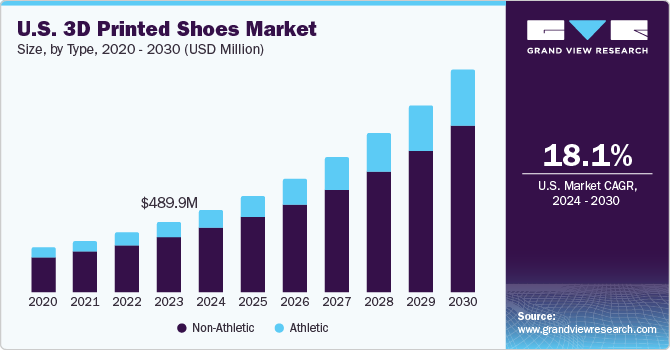
Moreover, the rapid pace of innovation within the 3D printing sector has introduced novel design possibilities and functionalities in footwear that resonate with the tech-savvy nature of these age groups. These innovations include shoes that offer enhanced support and durability and even incorporate smart features such as fitness tracking, appealing to the health-conscious aspects of their lifestyle. The trend towards on-demand manufacturing not only meets the expectations of Millennials and Gen Z for instant gratification but also aligns with the move towards more sustainable production methods by reducing inventory waste.
In November 2023, Louis Vuitton entered the 3D-printed footwear market with a new slip-on sneaker called the LV Cobra, which debuted at Pharrell Williams' LV men's pre-fall show in Hong Kong. The sneaker features texture printing, soft mesh, and smooth panels, with Louis Vuitton branding and the LV Monogram flower logo. The shoe is a collaboration with 3D printing sneaker company Zellerfeld, but release details are not currently available.
Sustainability and ethical considerations are taking center stage in consumer behavior, with a growing awareness around the environmental impact and ethical implications of their purchasing decisions. This shift in consumer consciousness is making 3D printed shoes, produced through sustainable practices, increasingly appealing. Technological advancements in material synthesis and printing techniques have made 3D printed footwear more accessible and cost-effective, expanding their attractiveness to both manufacturers and consumers. These innovations enable the use of eco-friendly materials and more efficient production processes, reducing waste and energy consumption.
Market Concentration & Characteristics
The market is experiencing a remarkable degree of innovation, characterized by groundbreaking advancements in food technology. The degree of innovation in 3D printed shoes is significant, representing a transformative shift in the footwear manufacturing process. Unlike traditional shoe production methods, which typically involve multiple steps and materials, 3D printing allows for the creation of intricate designs and customized footwear in a single manufacturing process. This technology enables precise customization of shoe components to fit individual foot shapes and sizes, enhancing comfort and performance.
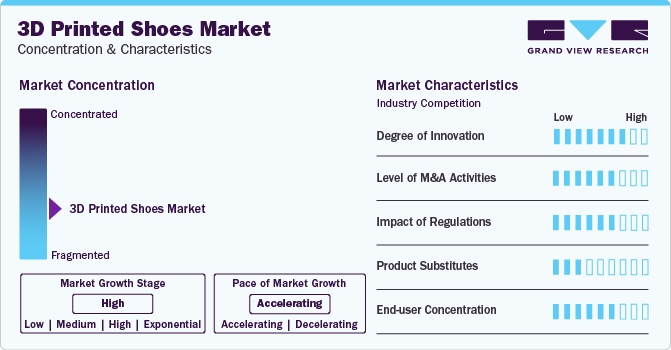
The level of mergers and acquisitions (M&A) activities in the 3D printed shoe industry is currently moderate. As the technology matures and market demand grows, companies are increasingly exploring strategic partnerships, acquisitions, and collaborations to enhance their capabilities, expand their product offerings, and gain a competitive edge.
Companies focus on strategic acquisitions to expand their presence overseas and reinforce their position in the global market. Over the next few years, internationally reputed companies are likely to acquire small-and medium-type companies operating in the industry in a bid to facilitate regional expansion.
Type Insights
Based on type, the non-athletic segment led the market with the largest revenue share of 78.7% in 2023. 3D printing technology allows for precise customization of shoe designs to fit individual foot shapes and sizes. Non-athletic shoes, such as casual sneakers or fashion-forward footwear, often prioritize aesthetics and style, making them ideal candidates for personalized designs. Consumers increasingly value unique and tailored products, driving demand for customized non-athletic 3D printed shoes.
In July 2023, ELASTIUM, a startup based in the UAE, launched its inaugural line of 3D printed sneakers crafted entirely from recyclable foam. These innovative sneakers feature a unique lattice-structured low-density thermoplastic elastomer (TPE) foam material, developed using ELASTIUM's proprietary granulate extrusion 3D printing technology. Designed for optimal comfort and durability, the sneakers boast a plushness reminiscent of Crocs paired with the cushioning prowess of high-performance sneakers.
The athletic segment is anticipated to grow at the fastest CAGR of 21.0% from 2024 to 2030. Athletes and fitness enthusiasts require footwear that offers optimal performance and support tailored to their specific needs. 3D printing technology allows for precise customization of shoe components, such as midsoles and outsoles, based on individual biomechanics and preferences. This customization enhances comfort, reduces the risk of injury, and improves overall athletic performance.
End-user Insights
Based on end-user, the women segment led the market with the largest revenue share of 63.4% in 2023. 3D printing technology enables designers to experiment with intricate designs, geometric patterns, and avant-garde aesthetics that may be difficult to achieve with traditional manufacturing methods. As a result, 3D printed shoes offer women a wider range of fashionable and stylish options, allowing them to express their individuality and stay ahead of the latest trends.
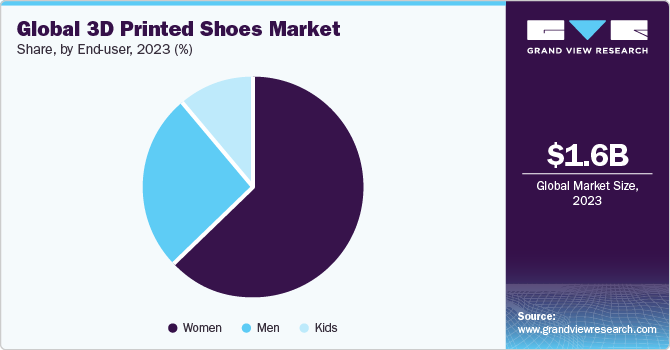
The men segment are projected to grow at the fastest CAGR of 19.8% from 2024 to 2030. Men often prioritize functionality and performance in their footwear. 3D printing technology allows for precise customization of shoe components, such as midsoles and outsoles, based on individual biomechanics and preferences. This customization enhances comfort, reduces the risk of injury, and improves overall athletic performance, making 3D printed shoes an attractive option for active men seeking personalized footwear solutions.
In January 2023,Dior unveils its latest 3D printed shoes, offering a close-up look at the innovative designs. The shoes feature a lattice-like surface, achieved through 3D printing, which adds a distinctive texture and futuristic appeal. This design element echoes the pioneering spirit of previous ventures in 3D printing technology, such as the iconic Adidas Futurecraft 3D running shoe.
Regional Insights
North America dominated the 3D printed shoes market with the revenue share of 39% in 2023. North America is home to some of the world's leading technology companies and research institutions. The region has seen significant advancements in 3D printing technology, including improvements in printing speed, accuracy, and material capabilities. These advancements have made it easier and more cost-effective to produce high-quality 3D printed shoes, driving adoption among manufacturers and consumers alike.
U.S. 3D Printed Shoes Market Trends
The 3D printed shoes market in the U.S. is expected to grow at the fastest CAGR of 18.1% from 2024 to 2030, owing to advances in 3D printing materials that have expanded the range of options available for durable, high-performance footwear, further driving the adoption of 3D printed shoes.
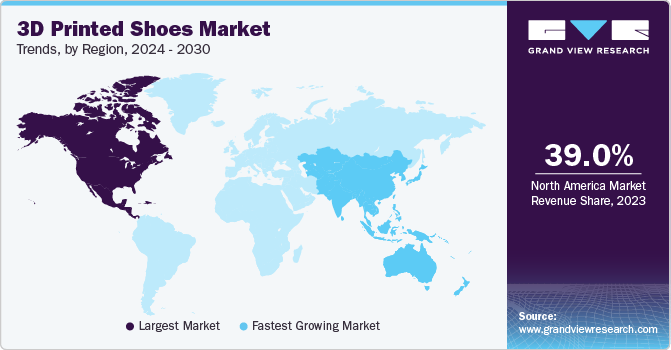
Asia Pacific 3D Printed Shoes Market Trends
The 3D printed shoes market in Asia Pacific is expected to grow at the fastest CAGR of 19.3% from 2024 to 2030. Many countries in the Asia-Pacific region, such as China, Japan, and South Korea, are major manufacturing hubs with well-established supply chains and production capabilities. This infrastructure makes it conducive for the adoption of 3D printing technology in footwear manufacturing. Companies can leverage existing manufacturing infrastructure to integrate 3D printing into their production processes, reducing costs and lead times.
Key 3D Printed Shoes Company Insights
The market for 3D printed shoes is highly competitive, with a range of companies offering various types. Many big players are increasing their focus on new types of launches, partnerships, and expansion into new markets to compete effectively.
Key 3D Printed Shoes Companies:
The following are the leading companies in the 3D printed shoes market. These companies collectively hold the largest market share and dictate industry trends.
- Nike, Inc.
- Adidas AG
- PUMA SE
- Skechers USA, Inc
- New Balance
- Timberland
- Peak Sport Shop
- Under Armour, Inc
- Feetz
- ECCO
Recent Developments
-
In June 2022, ECCO introduced 3D-printed footwear tooling for direct injection PU soles. Typically, molds rank as one of the highest-cost elements after upper materials and labor in footwear development and sampling. This cost, both in time and money, is amplified when producing shoes with the DIP process. Drawing on its extensive history of innovation and vertically integrated business model encompassing wholesale, retail, and e-commerce, ECCO aims to utilize 3D printing technology to expedite development and decrease the time and cost associated with launching new products
-
In August 2022, Adidas announced its latest innovation in running shoes, the 4DFWD. The shoe incorporates a unique 3D-printed bowtie-shaped lattice. Engineered to convert vertical pressure into horizontal force, Adidas claims that this design feature delivers a seamless and uninterrupted forward transition for runners
-
In February 2022, German footwear company Solebox and fashion designer Acronym collaborated with a team of creatives based in Berlin to develop an innovative range of downloadable content (DLC) for Nike trainers. These removable heel clips are specifically designed for 3D printing and can be attached to special edition Nike Blazer Lows. This addition allows wearers to personalize their shoes with a unique visual flair
3D Printed Shoes Market Report Scope
Report Attribute
Details
Market type value in 2024
USD 1.93 billion
Revenue forecast in 2030
USD 5.38 billion
Growth rate
CAGR of 18.6% from 2024 to 2030
Base year for estimation
2023
Historical data
2018 - 2022
Forecast period
2024 - 2030
Quantitative units
Revenue in USD million/billion, and CAGR from 2024 to 2030
Report coverage
Revenue forecast, company ranking, competitive landscape, growth factors, and trends
Segments covered
Type, end-user, region
Regional scope
North America; Europe; Asia Pacific; Latin America; Middle East & Africa
Country scope
U.S; Canada; Mexico; Germany; UK; Spain; Italy; France; China; India; Japan; South Korea; Australia & New Zealand; Brazil; Argentina; South Africa; UAE
Key companies profiled
Nike, Inc.; Adidas AG; PUMA SE; Skechers USA, Inc; New Balance; Timberland; Peak Sport Shop; ECCO; Under Armour, Inc; Feetz
Customization scope
Free report customization (equivalent up to 8 analyst’s working days) with purchase. Addition or alteration to country, regional & segment scope.
Pricing and purchase options
Avail customized purchase options to meet your exact research needs. Explore purchase options
Global 3D Printed Shoes Market Report Segmentation
This report forecasts revenue growth at the global, regional, and country levels and provides an analysis of the latest industry trends and opportunities in each of the sub-segments from 2018 to 2030. For this study, Grand View Research has segmented the global 3D printed shoes market report based on type, end-user, and region.
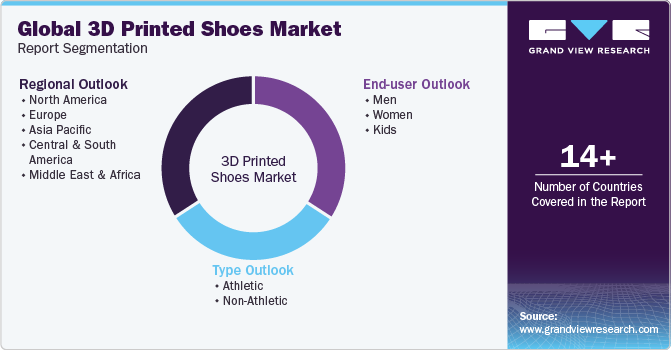
-
Type Outlook (Revenue, USD Million, 2018 - 2030)
-
Athletic
-
Non-Athletic
-
-
End-user Outlook (Revenue, USD Million, 2018 - 2030)
-
Men
-
Women
-
Kids
-
-
Regional Outlook (Revenue, USD Million, 2018 - 2030)
-
North America
-
U.S.
-
Canada
-
Mexico
-
-
Europe
-
Germany
-
UK
-
Spain
-
Italy
-
France
-
-
Asia Pacific
-
China
-
India
-
Japan
-
South Korea
-
Australia & New Zealand
-
-
Central & South America
-
Brazil
-
Argentina
-
-
Middle East & Africa
-
South Africa
-
UAE
-
-
Frequently Asked Questions About This Report
b. The global 3D printed shoes market size was estimated at USD 1.64 billion in 2023 and is expected to reach USD 1.93 billion in 2024.
b. The global 3D printed shoes market is expected to grow at a compounded growth rate of 18.6% from 2024 to 2030 to reach USD 5.38 billion by 2030.
b. Women is growing at a significant rate with a share of 63.7% in 2023. Women's footwear is often closely associated with fashion and style trends. 3D printing technology enables designers to experiment with intricate designs, geometric patterns, and avant-garde aesthetics that may be difficult to achieve with traditional manufacturing methods. As a result, 3D printed shoes offer women a wider range of fashionable and stylish options, allowing them to express their individuality and stay ahead of the latest trends.
b. Some key players operating in 3D printed shoes market include Nike, Inc., Adidas AG, PUMA SE, Skechers USA, Inc, and New Balance
b. Key factors that are driving the market growth include rising preference for customization and personalization and rapid adoption of technology.
Share this report with your colleague or friend.
Need a Tailored Report?
Customize this report to your needs — add regions, segments, or data points, with 20% free customization.

ISO 9001:2015 & 27001:2022 Certified
We are GDPR and CCPA compliant! Your transaction & personal information is safe and secure. For more details, please read our privacy policy.
Trusted market insights - try a free sample
See how our reports are structured and why industry leaders rely on Grand View Research. Get a free sample or ask us to tailor this report to your needs.










